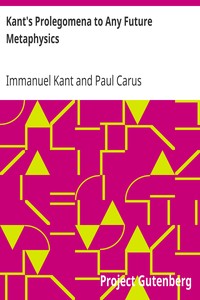Kant's Prolegomena to Any Future Metaphysics by Immanuel Kant
"Kant's Prolegomena to Any Future Metaphysics" by Immanuel Kant is a philosophical treatise written in the late 18th century. This work serves as an introductory text intended to make Kant’s complex ideas accessible and to explore the foundations of metaphysics. In this publication, Kant investigates the nature and possibility of metaphysics as a science, emphasizing the need for a critical examination of how synthetic knowledge a priori is possible, which sets the
stage for his broader philosophical arguments. The opening of "Prolegomena" introduces the necessity of questioning metaphysics and highlights its historical challenges, particularly through the skepticism introduced by David Hume. Kant argues that human reason must first determine whether metaphysics can be a valid science, discussing how pure a priori knowledge is formed and linking it to concepts of understanding and intuition. He posits that for metaphysical knowledge to exist, it must not rely on empirical observation but instead derive from the innate structures of human cognition. Kant's exploration at the beginning of this discussion sets the groundwork for understanding the nature of knowledge, drawing a critical line between empirical sciences and metaphysical reasoning. (This is an automatically generated summary.)
Read or download for free
| How to read | Url | Size | |||
|---|---|---|---|---|---|
| Read now! | https://www.gutenberg.org/ebooks/52821.html.images | 353 kB | |||
| EPUB3 (E-readers incl. Send-to-Kindle) | https://www.gutenberg.org/ebooks/52821.epub3.images | 200 kB | |||
| EPUB (older E-readers) | https://www.gutenberg.org/ebooks/52821.epub.images | 204 kB | |||
| EPUB (no images, older E-readers) | https://www.gutenberg.org/ebooks/52821.epub.noimages | 182 kB | |||
| Kindle | https://www.gutenberg.org/ebooks/52821.kf8.images | 448 kB | |||
| older Kindles | https://www.gutenberg.org/ebooks/52821.kindle.images | 425 kB | |||
| Plain Text UTF-8 | https://www.gutenberg.org/ebooks/52821.txt.utf-8 | 309 kB | |||
| Download HTML (zip) | https://www.gutenberg.org/cache/epub/52821/pg52821-h.zip | 197 kB | |||
| There may be more files related to this item. | |||||
Similar Books
About this eBook
| Author | Kant, Immanuel, 1724-1804 |
|---|---|
| Editor | Carus, Paul, 1852-1919 |
| Title | Kant's Prolegomena to Any Future Metaphysics |
| Note | Wikipedia page about this book: https://en.wikipedia.org/wiki/Prolegomena_to_Any_Future_Metaphysics |
| Credits | Produced by Kevin C. Lombardi |
| Reading Level | Reading ease score: 36.1 (College-level). Difficult to read. |
| Language | English |
| LoC Class | B: Philosophy, Psychology, Religion |
| Subject | Knowledge, Theory of -- Early works to 1800 |
| Subject | Metaphysics -- Early works to 1800 |
| Category | Text |
| EBook-No. | 52821 |
| Release Date | Aug 16, 2016 |
| Most Recently Updated | Sep 5, 2016 |
| Copyright Status | Public domain in the USA. |
| Downloads | 1443 downloads in the last 30 days. |
| Project Gutenberg eBooks are always free! | |

